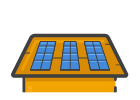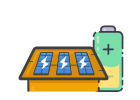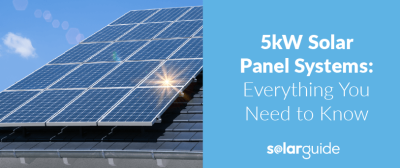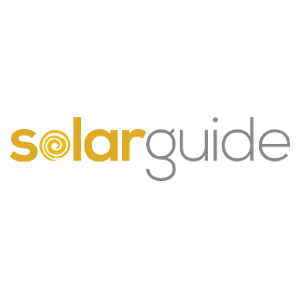Solar Battery Storage: Everything You Need to Know
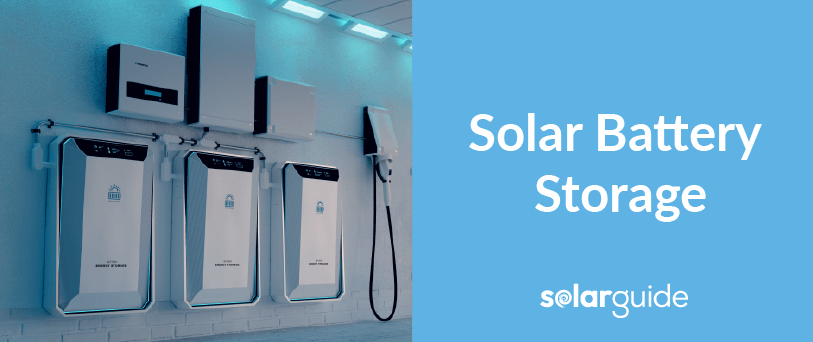
Imagine being able to power your home with clean and renewable energy, all while saving money on your electricity bills. A solar battery is the missing piece to this puzzle, allowing you to store the energy generated by your solar panel system and use it whenever you need it.
Find out all the essential information you need to know before investing in a solar battery. We’ll cover everything from what a solar battery is, how much it costs and the benefits, to available grants and how to score the best deal.
Are you ready to start benefiting from going solar? You can easily find the best deal for the best solar panels, solar batteries, or solar panels with battery storage by using Solar Guide’s free quote comparison service. It’s quick, easy, and powered by only the best solar professionals across the UK. The best part is that if you don’t like the quotes you received, you don’t have to accept any of them.
It all starts by letting us know what you’d like quotes for via our 30-second form. Just click below to begin.
Get your best deal
Quickly compare up to 4 free quotes
- It's free, easy and without obligation
- Compare quotes & get the best prices
- Save up to £915 per year

What is a solar battery?
A solar battery is a popular addition to install alongside a solar PV panel system to store excess energy. Depending on the size of your solar panel system, it could generate more electricity than your home can use during the day, so a solar storage battery system helps you maximise more of the solar energy you generate. And because solar panels only generate electricity when there’s sunlight, a solar battery helps to power appliances and keep the lights on when the sun goes down.
Solar battery storage technology allows you to use more of the free energy produced by the solar panels to save money and increase independence from the National Grid.
Without battery storage for solar, any excess electricity generated from solar panels will go to the grid to help power other homes. That means you wouldn’t be using the full potential of the electricity generated by your panels. So, for houses that run entirely on renewable solar energy, a solar battery is essential.
Contrary to popular belief, if you don’t have solar panels installed, you can still benefit from a solar battery. In those cases, you’ll store electricity collected from the National Grid and you’ll be able to use this stored energy as a backup, for instance potentially during a power outage, utility shut off, or during peak electricity times when energy is more expensive.
How does solar battery storage work?
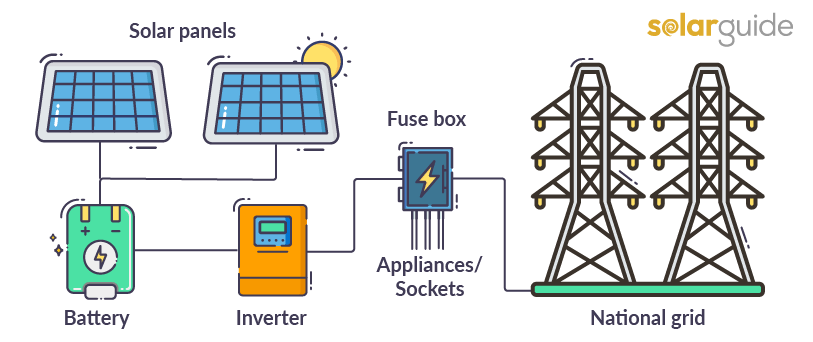
When you have a solar panel system fitted onto a roof, each panel - which is made up of solar cells - will convert sunlight into direct current (DC) electricity. The DC electricity will flow through an inverter to generate alternating current (AC) electricity, which is what’s used to power home appliances.
In a home without a solar battery, the energy that you don’t use for your home will be sent to the National Grid to be redistributed around the country. That means you can only use solar energy as and when it is available (i.e. when the sun is shining).
For homes that have lithium batteries installed, this excess electricity is able to be stored and used later, decreasing your dependence on the National Grid and on the weather.
Solar energy systems that can store their own electricity have three main components:
- Solar panels that absorb and convert the sun’s energy to DC electricity.
- A battery (or batteries) to store the electricity that is not used for when the solar panels aren't generating electricity.
- An inverter that converts DC electricity to AC ready for use in your lights, appliances etc.
As solar technology continues to progress, many modern systems also incorporate smart technology such as apps and Wifi so you can easily monitor the battery’s charge level and general efficiency.
How big is a solar battery?
The size of a solar battery usually refers to the battery’s kilowatt-hours (kWh). When determining what size solar battery you need, you should consider your energy usage and the size of the solar panel system installed.
So, if you already have an idea for your solar panel size, (for example, a 4kW solar system) one way you could approximate your battery size is by calculating how much time it takes to charge the battery. And vice versa to find what size solar panel to charge a specific battery size.
As an estimate, British Gas says the average British household has 2.4 people and uses 2,900 kWh of electricity annually. That breaks down to approximately 7 to 8.5 kWh of electricity per day depending on the appliances you use and your energy consumption. Hence, if you’re looking to use your solar battery alongside the grid, then an 8kWh solar battery would be able to deliver your energy. However, if you’re still not sure, check out our guide titled “how many solar panels do I need in the UK?”.
However, if you want your system to provide off-grid backup battery storage, then you’d be looking for a solar battery that can charge 3 to 5 times your daily amount. In this example you’d want one between 24 and 40 kWh.
Keep in mind that when calculating your energy demands, it’s not recommended to run a battery down to empty. It’s recommended to leave about 5 to 10% charge on your battery in order to maintain your battery’s health and to ensure you have enough charge to start your solar inverters again the next day.
How do solar batteries store energy?
When energy is stored in solar power batteries, it is stored in the form of DC (direct current) electricity. To use the stored energy in solar batteries to power home appliances, an inverter is required to convert the DC electricity into AC (alternating current) electricity.
The inverter ensures that the electricity output is at the right voltage and frequency so that it’s safe for use. It does this by converting the energy from the battery storage from DC to AC, ensuring that it is safe to use by household appliances.
What are the pros and cons of solar battery storage?
Whilst battery storage for solar can offer many advantages, such as increased energy independence and cost savings, it’s important to note that it may not be as beneficial for everyone. Here are some of the pros and cons of solar battery storage that you should consider before investing in this technology.
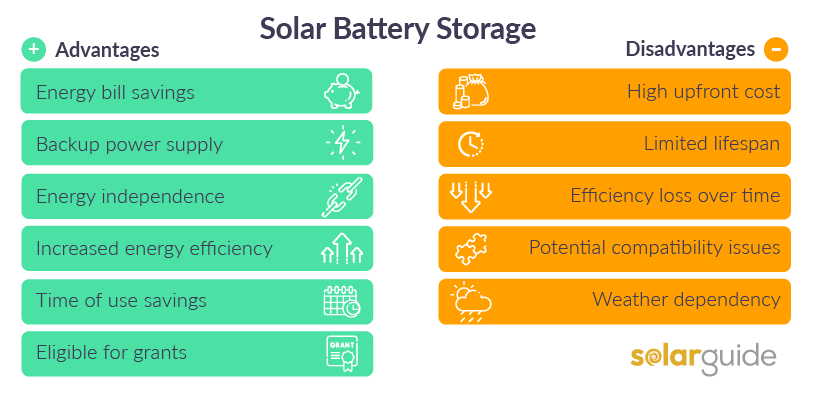
Advantages of solar battery storage
- Energy bill savings: By storing energy during times of lower demand you can have better energy management by reducing the amount you need to buy from your energy supplier when energy rates are higher, saving you money on your energy bills.
- Backup power supply: Some solar power batteries will enable you to use your solar electricity when there is a power cut so you're not left without power or lighting. When a power cut strikes, a store of this energy could be invaluable to your household.
- Energy independence: With home battery storage, homeowners can generate and store their own renewable energy, reducing their reliance on the grid and increasing energy independence.
- Increased energy efficiency: Solar batteries can help increase the efficiency of solar energy systems by reducing energy waste and ensuring a more stable power supply.
- Time of use savings: With the ability to store excess solar energy during the day, homeowners can take advantage of lower electricity rates during off-peak hours and reduce their energy costs even further.
- Eligible for grants. Homeowners can receive financial assistance to install renewable and sustainable measures, such as solar panels and solar batteries, to their home. It may be possible to save hundreds of pounds through a government solar panel grant or other scheme. See section below for more info.
Disadvantages of solar battery storage
- High upfront cost: The initial cost of purchasing and installing a solar battery storage system can be quite high, making it a significant investment for homeowners.
- Limited lifespan: Solar batteries have a limited lifespan and will eventually need to be replaced, adding to the overall solar panel costs in the UK over time.
- Efficiency loss over time: Solar batteries lose efficiency over time, meaning they won’t be able to store as much energy as they did when they were first installed.
- Compatibility issues: Solar battery storage systems may not be compatible with all solar energy systems, which can limit their effectiveness and increase overall costs.
- Weather dependency: Solar battery storage systems rely on sunlight to recharge, which can be limited during cloudy or rainy weather, reducing system performance.
While the initial cost of solar panels with battery storage can be significant, the long-term pros can outweigh the cons. However, to make it worthwhile, it’s crucial to get a good deal on a high-quality solar battery. That’s where getting multiple solar comparison quotes comes in handy.
By comparing quotes from different solar companies, you can ensure that you are getting the best possible deal on a solar battery and increase the chances of a successful and cost-effective solar energy project for your home or business. So, take the first step today by requesting up to 4 solar comparison quotes and start your journey towards a sustainable and cost-effective energy future.
Get your best deal
Quickly compare up to 4 free quotes

What types of solar batteries are there?
Solar energy is a great way to power your home, but it requires a reliable battery to store that energy. With several types of solar batteries to choose from, it can be difficult to determine which one is right for you. For instance, depending on your budget and energy needs, you may prefer lithium-ion batteries for their longevity and compact size, or lead-acid batteries for their affordability. We’ll break down each type for you.
Lead-acid battery
Lead-acid solar batteries are the oldest and cheapest option among the five types. They are commonly used in automotive and industrial applications. However, with the popularity of domestic battery storage increasing, other technologies with longer warranties and lower pricing are quickly replacing lead-acid batteries.
While lead-acid batteries are the cheapest option among the types, they have a shorter lifespan in general, lower depth of discharge, and require regular maintenance. Experts recommend not to run lead-acid batteries to a depth of discharge any higher than 50% to avoid negatively affecting their lifespan.
Despite these drawbacks, recent technological advancements have improved their lifespan, and lead-acid batteries remain a viable option for many homeowners.
Lithium-ion battery
Lithium-ion batteries are the most common for solar panels, offering a smaller, lighter, and more efficient option than lead-acid batteries. They are generally the most expensive of the 4 types, but are also the most efficient and have the longest lifespan. Lithium-ion batteries also have the ability to easily handle deep discharges of 80% or more, meaning they have a higher usable capacity.
However, they pose the risk of thermal runaway and can catch fire if not installed properly. All in all, lithium-ion batteries are evolving rapidly with the support of the electric car industry and popular products from Tesla Energy, they are expected to become the most popular choice for on-grid solar battery storage in the foreseeable future.
Lithium Iron Phosphate Battery
Lithium iron phosphate batteries (LiFePO4) are gaining popularity in the solar energy storage market due to their numerous advantages over other battery types. These batteries offer a longer lifespan, improved charge and discharge efficiency, and are safer than other lithium-ion and lead-acid batteries. LiFePO4 batteries are lightweight and require almost no maintenance, making them a solid investment over time despite their higher initial cost.
Super B lithium iron phosphate batteries are a prime example of this technology, with an average lifespan of 2 years. That’s equivalent to up to 5000 cycles at 80% depth of discharge. As the technology continues to improve, we can expect to see even more widespread adoption of LiFePO4 batteries in the solar energy market.
Nickel-cadmium battery
Nickel-cadmium batteries are known for their ability to operate at extreme temperatures without any complex battery management systems, making them more popular among commercial-scale projects. However, they are considered by many to be an old technology and are banned in many countries due to their high toxicity. The high toxicity also means that they are not the safest option, and users may prefer to choose more modern battery types like lithium-ion or flow solar batteries.
Flow battery
Flow batteries, despite being a new storage solution that still requires improvements, are becoming a popular option due to their ability to achieve a 100% depth of discharge, allowing for the entire stored energy to be used. They are also non-toxic as they are water-based, making them a safer option compared to nickel-cadmium batteries.
However, flow batteries are more expensive than the other options and occupy more space due to their low storage capacity. They depend on chemical reactions, meaning they have a low energy density and require large tanks to store significant amounts of energy. Therefore, they are better suited for larger spaces and applications rather than household use.
AC or DC?
Another way to classify solar batteries is by the electric current. You will need to consider if AC or DC is the best choice for your system. The main difference is in the way the battery connects - or doesn’t connect - to your solar panels.
An AC (alternating current) battery is not connected directly to your solar panels but is connected via the electricity metre. This means it is easier to retrofit existing panels, so if you have solar panels already in place this may be the best solution for you. You will need an additional inverter to convert DC electricity to AC for use in your home and then back to DC to be stored in the battery. Powervault 3 is an example of an AC-coupled system, while Tesla's Powerwall 2.0 is an example of a DC-coupled system.
DC (direct current) batteries tend to be installed at the same time as solar panels as they connect directly to the panels. You do not need an additional inverter as it is connected before the electricity metre.
Not all solar batteries enable you to use solar electricity during a power cut, so if this is a priority for you make sure you choose a battery which has this functionality.
When there is a drop in voltage on the grid, solar batteries detect this and will automatically turn off the inverter and disconnect your battery from the grid as a safety precaution; engineers will be working on electricity lines on the grid and if batteries are connected to it there is a risk of electrocution. This is called islanding and is essentially a safety barrier between your incoming supply and your fuse board.
If a back-up electricity supply is important you need to be looking at an AC coupled system. At the time of writing, we were only able to find 3 battery systems available in the UK that will keep the lights on during a power cut.
The Tesla Powerwall 2.0 with the Back-up Gateway. This updated version of the Powerwall 2.0 comes with a separate unit which looks like a smaller version of the battery itself and completely islands your home in the event of a power cut. The second and much cheaper option is the PureStorage battery system from PureDrive. Finally, the Samsung SDI can also provide emergency power during an outage. Always check with the manufacturer ahead of the installation as power-cut back-up may not be fitted as standard.
Find out more about solar back-up batteries and power cuts here.
How much does a solar storage battery cost?
It’s important to understand that how much you will pay for your solar storage battery depends on several factors, such as the size of the battery, battery type, manufacturer, and installation fees.
Solar battery prices can range from £2,500 to well over £10,000 before installation which is likely to cost around £500-£2,000.
Solar battery prices can range from £2,500 to well over £10,000 before installation which is likely to cost around £500-£2,000.
| Solar Battery | Usable Capacity (kWh) | Approx. Cost (excl. installation) |
|---|---|---|
| Tesla Powerwall 2 | 13.5 | £9,390 |
| Powervault 3 | 4.1 – 20.5 | £4,700 – £14,800 |
| LG Chem Resu 10H | 9.3 | £5,100 |
| Enphase Encharge 10T | 10.08 | £7,990 |
| Duracell Energy Bank | 3.3 | £4,499 |
It’s important to note that all of the solar battery storage prices you see in the table above are estimates. It’s likely that you will require a differently sized solar battery depending on the size of the solar system you have. For instance, for a 5kW solar system, you’ll need a solar battery with a 11 – 12kWh storage capacity. It’s important to note that the size of your battery will have a significant impact on your total expenses.
If you’re looking to get accurate and bespoke quotes for a solar battery, then we recommend comparing quotes. Start getting up to 4 quotes for solar panels or solar panels with battery storage for free by clicking the link below. The best part is that there’s nothing to lose as you’re not obligated to accept any of the quotes you receive.
Get your best deal
Quickly compare up to 4 free quotes

Can I get a grant for solar batteries?
Are you interested in installing solar batteries but concerned about the cost? You might be eligible for a grant! There are many financial incentives and opportunities to help homeowners make the switch to renewable energy.
In this section, we’ll provide an overview of the available grants and programs, and help you determine if you’re eligible to apply. Don’t miss out on this opportunity to save money and reduce your carbon footprint!
Smart Export Guarantee
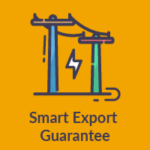 Since January 2020, the Smart Export Guarantee (SEG) has allowed small-scale low-carbon electricity generators to earn money by exporting surplus energy back to the grid. As an SEG Generator with a solar battery, you can shop around for the best price per kWh from different SEG Licensees, with the best rates generally ranging from 1p to 7.5p per kWh. Additionally, some energy suppliers offer special rates for energy exported from specific solar battery storage systems.
Since January 2020, the Smart Export Guarantee (SEG) has allowed small-scale low-carbon electricity generators to earn money by exporting surplus energy back to the grid. As an SEG Generator with a solar battery, you can shop around for the best price per kWh from different SEG Licensees, with the best rates generally ranging from 1p to 7.5p per kWh. Additionally, some energy suppliers offer special rates for energy exported from specific solar battery storage systems.
Homeowners with regular solar panel systems up to 5 MW capacity are eligible, provided they have a smart metre installed to measure exports. For example, as the owner of an average 3-bedroom home with a 4kW solar panel system, you could earn £38.5 annually from SEG based on a 5.5p per kWh rate.
Reduced VAT until 2027
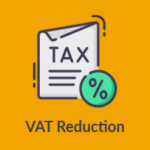 From April 2022 until March 2027, the VAT on energy-saving materials, including solar panels and solar batteries, will be reduced from 5% to 0%. This VAT reduction is only eligible for solar batteries when purchased and installed alongside a qualifying product, which in this case is a solar panel system.
From April 2022 until March 2027, the VAT on energy-saving materials, including solar panels and solar batteries, will be reduced from 5% to 0%. This VAT reduction is only eligible for solar batteries when purchased and installed alongside a qualifying product, which in this case is a solar panel system.
According to the UK Government, a typical household with rooftop solar panels will save more than £1,000 in total installation costs, in addition to £300 in yearly energy expenses.
In March 2027, the VAT-free period will end, and the rate will return to 5%. If you want to get a head start before it ends, you can begin by comparing solar panel prices to save you the most money.
Home Energy Scotland Loan
 Not only can this loan decrease the cost of solar panels in Scotland by up to £7,500, but also applies to solar batteries. The Home Energy Scotland Loan is a Scottish Government funded scheme that helps homeowners afford energy-efficient and renewable energy measures. Scottish homeowners can get loans for up to 75% of the costs depending on the measure being installed. Cashback is based on total cost and capped at a maximum value.
Not only can this loan decrease the cost of solar panels in Scotland by up to £7,500, but also applies to solar batteries. The Home Energy Scotland Loan is a Scottish Government funded scheme that helps homeowners afford energy-efficient and renewable energy measures. Scottish homeowners can get loans for up to 75% of the costs depending on the measure being installed. Cashback is based on total cost and capped at a maximum value.
That means, as a homeowner, you could get a loan for the costs of a solar photovoltaic system and an additional £6,000 for an energy storage system (i.e. a solar battery).
Are solar batteries worth it for my home?
The final question to ask now is “are solar panels worth it in the UK?”, and the answer is: it depends. Solar power batteries can be an excellent investment for your home, especially for those who live in areas with unreliable power grids, experience frequent power outages, or simply just want to reduce their carbon footprint. It’s also a wise investment for homeowners in areas with Time-of-Use rates that make electricity more expensive during peak hours.
With today’s high-efficiency solar panels and solar batteries, it’s more affordable than ever to power your home exclusively using solar energy. However, the cost of a solar battery installation can still be a significant factor to consider. But, financial incentives such as grants and loans can help offset the cost, making it a more affordable option.
Furthermore, if you’re signed with a provider that offers full-retail net metering, a solar battery might not be worth the investment if your primary goal is to save money on your energy bills. However, if your goal is to reduce your carbon emissions and to produce your own renewable energy, then a solar battery is essential to doing this.
All in all, it’s recommended to consult with a solar energy expert to determine if a solar battery is a cost-effective option for your home.
Use our free quote comparison service and you can request up to 4 quotes for solar panels and batteries from reputable solar professionals in your area. Each solar professional will advise and tailor a quote for you based on your specific solar situation. Click below to get started with our 30-second contact form.
Get your best deal
Quickly compare up to 4 free quotes

FAQ
How long do solar batteries last?
On average, you can expect your solar battery to last between 5 and 15 years, with most batteries having a 10-year warranty. How long your battery lives depends on factors such as, battery type, installation, depth of discharge, cycle life, environment, and maintenance. Lithium-ion batteries tend to have the longest lifespan.
How long will a 10kW solar battery last?
The expected lifespan of a battery depends mainly on the battery type and manufacturer. You can expect a 10kW lithium-ion solar battery to last, on average, 15 years.
Will a solar battery power my house?
While a solar battery won’t directly power your house alone, it can power your house if first charged by a solar panel system. A solar battery can also operate without solar panels by storing electricity from the grid.
Do you need solar panels to have a solar battery?
No, if you live in an area affected by regular power cuts then a home battery could be just the system you need to keep the lights on. On average you’ll probably get around 24 hours of backup power but this can be increased by simply installing more batteries. You can even make money by storing energy for the National Grid which can discharge it from you in times of need.
Find local, MSC certified Solar Installers
Start your quote
Find local, MSC certified Solar Installers






